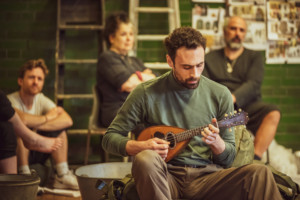Interview: Alex Mugnaioni Talks CAPTAIN CORELLI'S MANDOLIN

Louis de Bernières' novel Captain Corelli's Mandolin, about the German occupation of the Mediterranean during World War Two, was a smash hit when it came out in 1994, selling millions of copies and spawning a Hollywood film adaptation.
Now, it's coming to stages across the UK, with a new script by playwright Rona Munro. Alex Mugnaioni, who stars as Captain Corelli, tells us what he loved about the book, and why the play is so important today.
Let's start by talking about the novel. Were you a fan before you started working on the play?
I actually had never read it! (laughs)
Did you read it?
I've read it now. It's one of those things you should do - I knew about the film and the book, but Captain Corelli is one of those things that's weirdly just sort of deep in the psyche of British culture somewhere. So I knew about it, but I had never read it.
That's funny that you say that Captain Corelli is in the British psyche - I'm Canadian, and I had never heard of it until I got here. So tell me - why is it up there?
That's a really good question. It was released in the 90s and it was a huge book - it sold millions and millions of copies. It was a big book for my parents - they remember everyone reading it on the trains - and that's kind of filtered down. And then the film came out, and that sort of kept the ball up in the air.
Now, it's sort of 25 years since the book was published, so it's just the amount of time where my generation would want to be hearing that story again. It's cycling round again.
Also, it's a story that just feels timeless - in the same way Shakespeare is, in that it's to do with human nature, and emotions like love and loss and endurance. Captain Corelli is really just based in the human struggle. It's set in a very specific moment, but it's about those human emotions which transcend that specific event. It's so much about the relationships, rather than a study of that specific time.
How does that come across on stage?
When it transitions to stage, you're obviously going to lose certain things, but Rona Munro, the adaptor, what she's done is kept all the vital blood flow that's in that book and condensed it slightly. So all the key events are in there, but they might be slightly condensed, or pushed together in a slightly different way.
The audience can expect to get all the major plots, including the homosexual story of Carlo, which was completely omitted in the film. Especially seeing as the book is so much about love in all of its forms, and how that can endure and power through devastating events, to omit such an important part of the book was kind of a travesty, really. But in this version it's vital, and Carlo plays a really big part.
So Rona's done a really fantastic job of keeping the life of the book in there while still condensing it for stage.
It sounds like the show will be full of exciting moments, but I wonder: is there one in particular you think everyone should really look forward to?
Oh, goodness - I don't want to give anything away! (laughs) There's going to be lots of really surprising moments, and Melly [Still], the director, she's doing some incredible stuff with movement, and we have a really amazing composer, lighting designer and sound designer, so it will be a feast of all the senses. Great acting, music, movement - to pick just one moment out is quite difficult.
But maybe...I was going to say when Captain Corelli plays the mandolin, but I don't want to put too much pressure on myself! (laughs) There's going to be loads of amazing moments, and it's going to surprise people in a really joyous way I think.
I feel like I have to ask about the politics, because everything today feels just so political, and the book itself, of course, has political content in it.
Do you know what, interestingly, the politics of it all hasn't been a defining conversation in the rehearsal room. And I think that's because it's, as I said earlier, so much to do with the relationships, with the people, and how those individual human stories are affected by the bigger picture.
No matter what the politics are, whether it's World War Two, whether it's not, whether it's Brexit, whether it's Trump - what the story focused on is how the people beneath that political umbrella are affected.
I mean, there is talks of communists and partisans and different political factions, but ultimately, the most vital thing within the show, within the narrative, is how all those people interact with each other, and how they find a way to live together.
In terms of that, I mean, there's a rise of fascism happening now, so I wouldn't say it's like a call to arms or anything, but it might be seen as a reminder of what can happen if those ideals are left to run rampant. Possibly as well that's why this story will feel relevant, as a kind of wake-up call.
Comments

Videos

